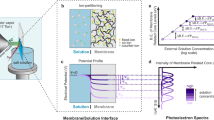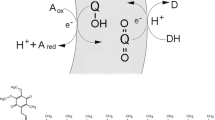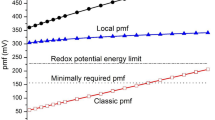Abstract
CONTINUOUS redox processes have been effected between aqueous reactants, separated by liquid membranes in which coenzyme Q, or vitamin K, is present as a carrier molecule. These membranes show chemical specificity and function which relate closely to certain biological electron transfer processes.
This is a preview of subscription content, access via your institution
Access options
Subscribe to this journal
Receive 51 print issues and online access
$199.00 per year
only $3.90 per issue
Buy this article
- Purchase on Springer Link
- Instant access to full article PDF
Prices may be subject to local taxes which are calculated during checkout
Similar content being viewed by others
References
Clark, W. M., Oxidation–Reduction Potentials of Organic Systems (Baillière, Tindall and Cox, London, 1960).
Latimer, W. M., Oxidation Potentials, 2nd Ed. (Prentice-Hall, New York, 1952).
Author information
Authors and Affiliations
Rights and permissions
About this article
Cite this article
ANDERSON, S., LYLE, I. & PATERSON, R. Electron transfer across membranes using vitamin K1 and coenzyme Q10 as carrier molecules. Nature 259, 147–148 (1976). https://doi.org/10.1038/259147a0
Issue Date:
DOI: https://doi.org/10.1038/259147a0
This article is cited by
-
Beitr�ge zur Chemie der Pyrrolpigmente, 78. Mitt.: Die Eigenschaften desb-Nor-bilatrien-abc-b-Nor-biladien-ac-Systems
Monatshefte f�r Chemie Chemical Monthly (1988)
-
Supramolecular chemistry ? Scope and perspectives: Molecules ? Supermolecules ? Molecular devices
Journal of Inclusion Phenomena (1988)
-
Photosensitised electron transport across phospholipid vesicle walls
Nature (1978)
Comments
By submitting a comment you agree to abide by our Terms and Community Guidelines. If you find something abusive or that does not comply with our terms or guidelines please flag it as inappropriate.



